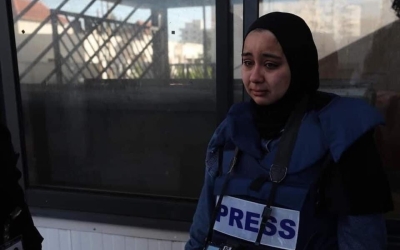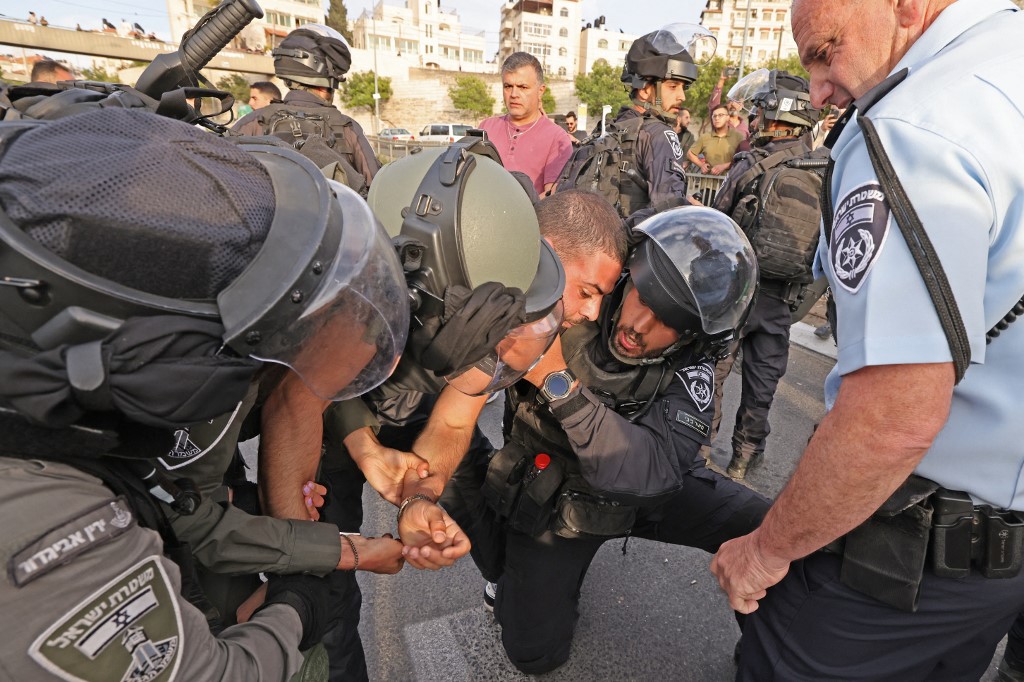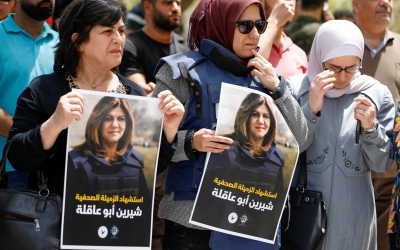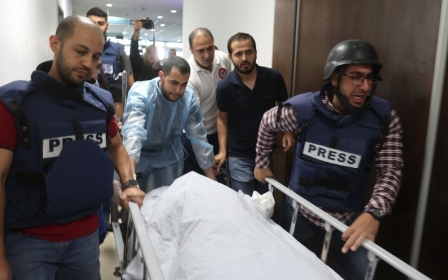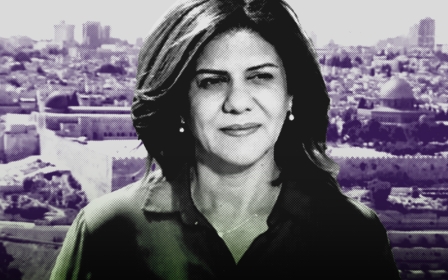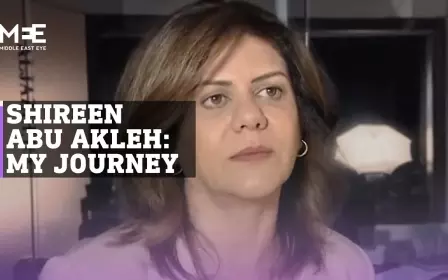Shireen Abu Akleh killing: The West cannot wash away the stain of complicity
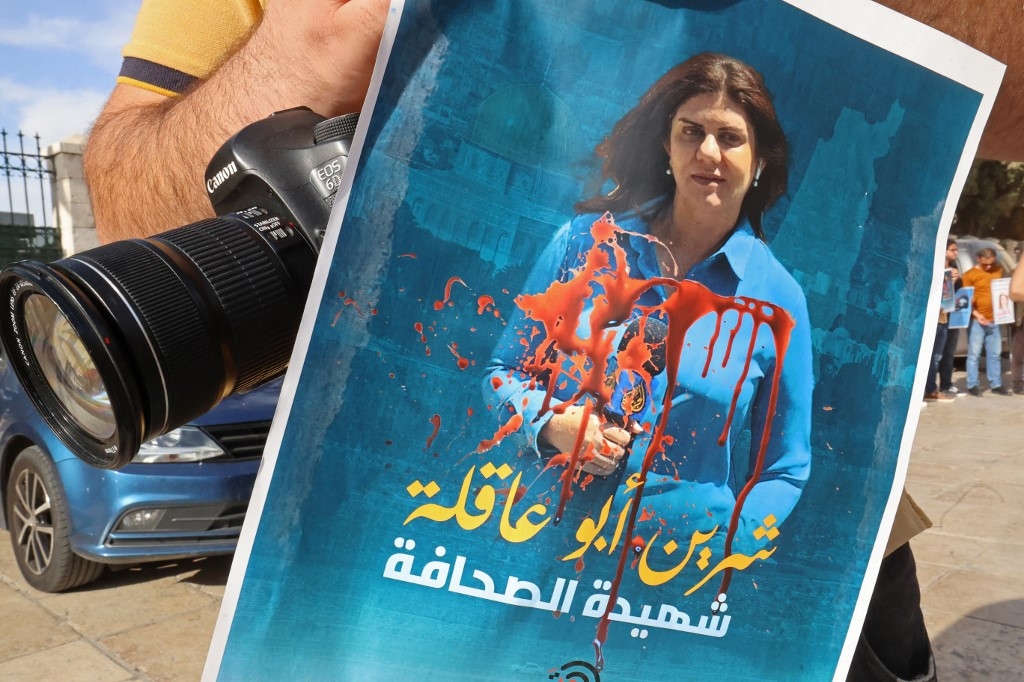
For months now, a revolt has been brewing in the occupied West Bank. The Palestinian Authority has lost control over Jenin, where resistance to nightly Israeli armed incursions unifies all factions.
The Shin Bet, the domestic Israeli intelligence service, is also stumped. The gun attacks on Israelis are the work of Palestinians with little or no connection to each other, let alone to armed groups.
Nor is there evidence these attacks are organised or coordinated. The common denominator appears to be a growing refusal to tolerate occupation.
This is not the cyclical round of fighting that dies down when a battle burns itself out, or when the Israelis issue more work permits for migrant workers, and life goes back to what constitutes normal in this part of the world.
Knowing the illegitimacy of their actions, they want to kill any version of events that rivals their own
This time, it is different. A new generation of Palestinians, many of whom were not even born when the First or Second Intifadas erupted, stands ready to step up to the fight. They are fearless and leaderless.
But until today, this generation had no name, face or icon to lead it. Now they do. It is that of a Palestinian woman called Shireen Abu Akleh.
Abu Akleh, a veteran Al Jazeera correspondent, was gathered among a group of journalists near a roundabout outside Jenin refugee camp on Wednesday. They had gathered, as they did most days, to cover a raid on Jenin camp and a subsequent gunfight in the camp’s alleyways between Israeli forces and Palestinian fighters.
The location where the shooting occurred is important. The journalists were standing at a roundabout to which Palestinian fighters do not dare venture, because they would be out in the open and lacking cover. Multiple witnesses say the gunfight in the alleyways was some distance from where the journalists had gathered.
Eyewitness account
As was made clear by the eyewitness account given to MEE by journalist Shatha Hanaysha, who was next to Abu Akleh when she was shot, the group of journalists made their presence known to Israeli forces for 10 minutes before moving uphill towards the camp. No warning shots were fired. Her colleague, Al Jazeera producer Ali al-Samoudi, was hit first in the back. Abu Akleh and Hanaysha were trapped on the other side of the street, with their backs to the wall for cover.
“Right then, another bullet pierced Shireen’s neck, and she fell to the ground right next to me,” Hanaysha said. “I called her name but she didn’t move. When I tried to extend my arm to reach her, another bullet was fired, and I had to stay hiding behind a tree. That tree saved my life, as it was the only thing obstructing the soldiers’ view of me.”
The Israeli army acknowledged that soldiers were conducting an operation in the area at the time, and swiftly tried to pin the shooting on Palestinian fighters. It said there was an exchange of fire between its troops and Palestinian fighters and that it was investigating whether “journalists were wounded, possibly by Palestinian gunfire”.
To prove this point, both the military and the Israeli embassy tweeted a video of Palestinian gunmen in Jenin firing down an alley, suggesting they were responsible. Israeli NGO B’Tselem visited the scene where that footage was taken and said it was impossible for Abu Akleh to have been hit from there.
The US ambassador called for an inquiry although with an obvious faint heart.
Saudi journalist Jamal Khashoggi, murdered in Turkey by a hit squad sent from Riyadh, was a resident of Virginia but not an American citizen. Abu Akleh, a Palestinian American, was a US citizen. Khashoggi’s murder led to a major diplomatic rift between Washington and Riyadh that has lasted more than three years and remains unresolved. Abu Akleh’s killing is part of a joint operation with the Israeli army to challenge the known facts, before her body has even been buried.
'No need to apologise'
Not that the Israelis think they have anything to apologise for. Israeli army spokesperson Ran Kochav told Army Radio that “even if soldiers shot at - or, God forbid, hurt - someone who was not involved, this happened in battle, during a firefight, where this Palestinian is with the shooters. So this thing can happen.”
Kochav described Abu Akleh as “filming and working for a media outlet amidst armed Palestinians. They’re armed with cameras, if you’ll permit me to say so.”
Kochav’s colleagues agree. Former Israeli army spokesperson Avi Benayahu said: “Let us suppose that Shireen Abu Akleh was killed by the army’s bullets. There is no need to apologise for that.”
Far-right Israeli Knesset member Itamar Ben-Gvir was even less inhibited, tweeting: “I fully support Israeli soldiers, as Al Jazeera correspondents have often obstructed their work by intentionally standing in the middle of the battlefield.”
So apparently, the answer is: “Even if it was an Israeli sniper who killed her, what’s the problem with shooting journalists?” A reply not unlike the one Saudi Crown Prince Mohammed bin Salman gave about Khashoggi’s murder.
Abu Akleh is not the first journalist to be killed by Israeli sniper fire. Just two weeks ago, legal submissions alleging the systematic targeting of journalists working in Palestine were filed with the International Criminal Court. They were filed by the International Federation of Journalists, the Palestinian Journalists Syndicate (PJS) and the International Centre of Justice for Palestinians, on behalf of four journalists - Ahmed Abu Hussein, Yaser Murtaja, Muath Amarneh and Nedal Eshtayeh - who were killed or maimed while covering demonstrations in Gaza.
The PJS said in 2020 that at least 46 journalists had been killed in Palestine since 2000, and not one Israeli soldier or officer has been held to account. These incidents, the legal filing alleges, might amount to war crimes.
Martyr for the Palestinian cause
We can be sure of one thing from the very countries that get so righteous about Russian war crimes in Ukraine. There will be total silence about this death, the 58th Palestinian to be killed this year, as there was about all the others.
But there will not be total silence on the Palestinian side. Within minutes of her death in hospital, Abu Akleh’s body was carried by every Palestinian faction through the streets of Jenin. Religion here does not matter. Muslim fighters prayed for her in a Christian ceremony.
A Palestinian Christian and a Jerusalemite, Abu Akleh has today become a martyr for the Palestinian cause. She was long known to millions of Palestinians worldwide as the face of the Second Intifada. A veteran journalist, unencumbered by links to any political faction, she had covered every event since then with the same professionalism that led her to be at that roundabout in Jenin on Wednesday morning.
Abu Akleh was there at the start of Al Jazeera. In a video marking its 25th anniversary, she explained her motivation for carrying on: “I’ll never forget the amount of destruction or the feeling that death was so close to us. We would barely see our homes. We would carry our cameras and move across the military checkpoints and uneven roads. We would spend our nights in hospitals or with people we did not know. And despite the dangers, we were adamant to continue our work.
“That was in the year 2002, when the West Bank witnessed an invasion not witnessed since the occupation in 1967,” she continued. “In the difficult moments, I overcame my fear because I chose journalism to be close to the people. Maybe it’s not easy for me to change the reality, but I was at least able to deliver that sound to the world.”
The Israeli army is motivated by the same desire as the Russian army in Ukraine or the Egyptian army in Sinai to suppress independent reporting of what they are doing. Knowing the illegitimacy of their actions, they want to kill any version of events that rivals their own.
This way, there is only one truth to come out of operations such as the one in Jenin: theirs. And they are increasingly determined to keep it that way. Abu Akleh’s presence was stopping that, so they killed her.
Cynical silence
But Israel needs international cover to continue doing this, and it is willingly provided by the very countries fighting Russia with such moral certainty in the righteousness of their actions.
These include the US and the UK, which just 24 hours ago announced its intention during the Queen’s Speech to pass legislation banning local councils and other public bodies from participating in boycott and divestment campaigns - the principal target of which is the Palestinian BDS movement.
We ban boycotts, ban non-violent action, and provide cover when Israeli snipers kill journalists deliberately
So we ban boycotts, ban non-violent action, and provide cover when Israeli snipers kill journalists deliberately. There could be no brighter green light given to Israel to continue what it is doing.
And it is. A week ago, Israel’s high court ruled that 1,000 Palestinians could be evicted from an area of the occupied West Bank and the land repurposed for military use - one of the biggest expulsions of Palestinians since the occupation began in 1967.
Abu Akleh sacrificed her life to show the world what is really going on, and she is by no means alone. There are other brave Palestinian women doing the same thing. Their work is a stain on the conscience of a western world that apes moral values when it suits it, and discards them down a collective waste disposal unit when it does not.
It claims to be defending democracy and free speech in its fights with enemies and is cynically silent about the transgressions of its allies.
But the stain that arises from looking the other way will not be washed away with time. It’s indelible.
One US secretary of state after another, be they a brazen right-winger or a hand-wringing liberal, is just as culpable in Abu Akleh’s killing as the sniper whose finger was on the trigger.
The views expressed in this article belong to the author and do not necessarily reflect the editorial policy of Middle East Eye.
This article was corrected on 19 May to say that the video of Palestinian gunmen in Jenin firing down an alley was published by the Israeli embassy. The original incorrectly said it was shared by the US embassy.
This article is available in French on Middle East Eye French edition.
Middle East Eye propose une couverture et une analyse indépendantes et incomparables du Moyen-Orient, de l’Afrique du Nord et d’autres régions du monde. Pour en savoir plus sur la reprise de ce contenu et les frais qui s’appliquent, veuillez remplir ce formulaire [en anglais]. Pour en savoir plus sur MEE, cliquez ici [en anglais].



